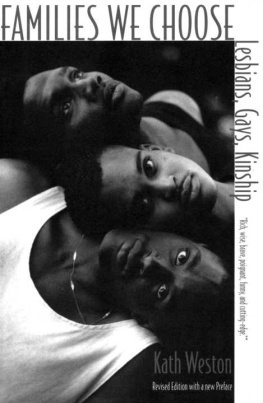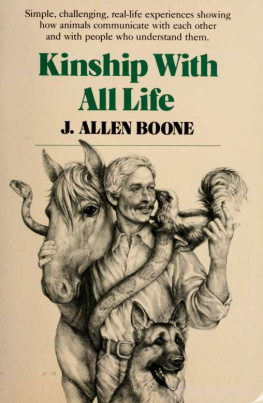BETWEEN MEN--BETWEEN WOMEN
Lillian Faderman and Larry Gross, Editors
FAMILIES
WE
CHOOSE
SETWEEN MEN--BETWEEN WOMEN
LESBIAN AND GAY STUDIES
Lillian Faderman and Larry Gross, Editors
Rebecca Alpert, Like Bread on the Seder Plate: Jewish Lesbians and the Transformation of Tradition
Edward Alwood, Straight News: Gays, Lesbians, and the News Media
Corinne E. Blackmer and Patricia Juliana Smith, editors, En Travesti: Women, Gender Subversion, Opera
Alan Bray, Homosexuality in Renaissance England
Joseph Bristow, Effeminate England: Homoerotic Writing After 1885
Beverly Burch, Other Women: Lesbian Experience and Psychoanalytic Theory of Women
Claudia Card, Lesbian Choices
Joseph Carrier, De Los Otros: Intimacy and Homosexuality Among Mexican Men
John Clum, Acting Gay: Male Homosexuality in Modern Drama
Gary David Comstock, Violence Against Lesbians and Gay Men
Laura Doan, editor, The Lesbian Postmodern
Emma Donoghue, Poems Between Women: Four Centuries of Love, Romantic Friendship, and Desire
Allen Ellenzweig, The Homoerotic Photograph: Male Images from Durieu/Delacroix to Mapplethorpe
Lillian Faderman, Odd Girls and Twilight Lovers: A History of Lesbian Life in Twentieth-Century America
Linda D. Garnets and Douglas C. Kimmel, editors, Psychological Perspectives on Lesbian and Gay Male Experiences
renee c. hoogland, Lesbian Configurations
Richard D. Mohr, Gays/Justice: A Study of Ethics, Society, and Law
Sally Munt, editor, New Lesbian Criticism: Literary and Cultural Readings
Timothy F. Murphy and Suzanne Poirier, editors, Writing AIDS: Gay Literature, Language, and Analysis
Noreen O'Connor and Joanna Ryan, Wild Desires and Mistaken Identities: Lesbianism and Psychoanalysis
Don Paulson with Roger Simpson, An Evening in the Garden of Allah: A Gay Cabaret in Seattle
Judith Roof, Come As You Are: Sexuality and Narrative
Judith Roof, A Lure of Knowledge: Lesbian Sexuality and Theory
Claudia Schoppmann, Days of Masquerade: Life Stories of Lesbians During the Third Reich
Alan Sinfield, The Wilde Century: Effeminacy, Oscar Wilde, and the Queer Moment
Jane McIntosh Snyder, Lesbian Desire in the Lyrics of Sappho
Chris Straayer, Deviant Eyes, Deviant Bodies Sexual Re-Orientations in Film and Video
Dwayne C. Turner, Risky Sex: Gay Men and HIV Prevention
Thomas Waugh, Hard to Imagine: Gay Male Eroticism in Photography and Film from Their Beginnings to Stonewall
Kath Weston, Families We Choose: Lesbians, Gays, Kinship
Kath Weston, Render Me, Gender Me: Lesbians Talk Sex, Class, Color, Nation, Studmuffins ...
Carter Wilson, Hidden in the Blood: A Personal Investigation of AIDS in the Yucatan
Jacquelyn Zita, Body Talk: Philosophical Reflections on Sex and Gender
KATH WESTON
LESBIANS,
GAYS,
KINSHIP





BETWEEN MEN--BETWEEN WOMEN
LESBIAN AND GAY STUDIES
Lillian Faderman and Larry Gross, Editors
Advisory Board of Editors
Claudia Card
Terry Castle
John D'Emilio
Esther Newton
Anne Peplau
Eugene Rice
Kendall Thomas
Jeffrey Weeks
Between Men-Between Women is a forum for current lesbian and gay scholarship in the humanities and social sciences. The series includes both books that rest within specific traditional disciplines and are substantially about gay men, bisexuals, or lesbians and books that are interdisciplinary in ways that reveal new insights into gay, bisexual, or lesbian experience, transform traditional disciplinary methods in consequence of the perspectives that experience provides, or begin to establish lesbian and gay studies as a freestanding inquiry. Established to contribute to an increased understanding of lesbians, bisexuals, and gay men, the series also aims to provide through that understanding a wider comprehension of culture in general.
In memory of Julie Cordell 1960-1983 who came looking for community
CONTENTS
PREFACE TO THE
PAPERBACK EDITION
It was one of those quiet midwestern nights, the August sky so tranquil or restrained you felt compelled to shut the television off or plunge your hands into the steaming ground or maybe look over your shoulder and run. We were having a family talk, and I was there for the duration.
"What's the big deal? I just don't get it." My stepfather turned quizzically in my direction. "If you're gay, you're gay. So what? Why make such a fuss over nothing?"
The sincerity in his question tugged at me. I leaned back to give the wall a little support. Then I sat for a moment, still as the night around us, pulled ten years past into a comment made by someone I interviewed for Families We Choose. "I don't think straight people have any idea," she had insisted, "how painful family issues can be for lesbians and gaymen."1
My stepfather had voiced a sort of liberal counterpoint to the classic myth that people who find themselves attracted to others of the same sex must learn to live without family. When I began the field research for this book in the mid-i98os, popular wisdom had it that lesbians, gay men, and bisexuals put kinship ties at risk whenever they decided to come out. Many worried that if they told relatives about their sexual identities, they would alienate the very people who had seen them through to adulthood. Otherwise sympathetic brothers and parents and cousins worried, in turn, that their loved ones would be doomed to a series of fleeting relationships that couldn't possibly last. As one woman's disapproving mother put it, "Even a dog shouldn't have to die alone."
In the end, sheer living usually dispelled such fears. Stories about coming out to relatives might have highlighted the threat of rejection, but the actual experience of being disowned turned out to be much more the exception than the rule. Many a family discovered ways to work out initial shock or misunderstanding or rage as the years passed. Some families even seemed to take the news in stride. The notion that same-sex couples lack staying power generally failed to convince after family members met gay people in long-term relationships. Yet these concerns about family betrayal and kinship lost are not to be taken lightly. People have to muster friendship, courage, and whatever flair they have for negotiation to dispatch this particular set of demons.
Of course there are still relatives who warn that their nephew's "tragic lifestyle" can only bring heartache. (Never mind that his sister's ten-year heterosexual marriage, which had not been preceded by any such dire predictions, ended unhappily.) But today the myth that queer sexuality spells the end of family ties coexists uneasily with my stepfather's mantra of tolerance for the twenty-first century: What's the big deal? His words allude to a contemporary tale of reversed expectations. For people who believe that the world has now become a safer place for queers, the shock occurs not when relatives offer acceptance, but when the act of bringing home a lover turns out to be a big deal after all.








